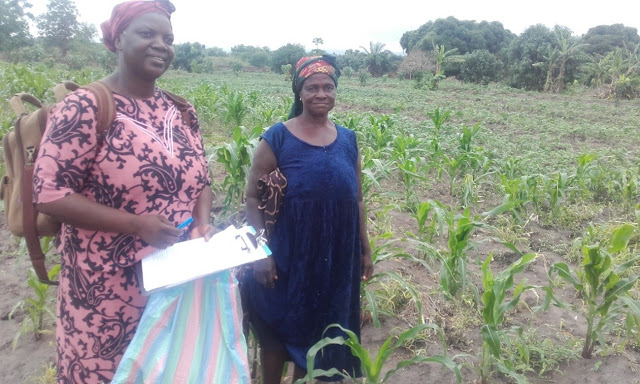Host Institution: Department of Soil Science, University of Ghana, Legon, Ghana
The relationship between climate change and soil carbon resources is of key concern to human society. The adverse effect of climatic warming on the global soil environment has emerged and aroused extensive attention in the world. Soils are intricately linked to the atmospheric–climate system through the carbon, nitrogen, and hydrologic cycles. Altered climate will therefore have an effect on soil processes and properties, and at the same time, the soils themselves will have an effect on climate. With proper management, soils have the potential to sequester carbon from the atmosphere. Soil’s usefulness as a carbon sink and drawdown solution is essential, based on global estimates of historic carbon stocks and projections of rising emissions. To ensure safe levels of atmospheric carbon, and to mitigate climate change, efforts to sequester carbon will be necessary.
 |
| Residue retention practices for carbon sequestration and climate change mitigation. |
Land use conversion and agricultural activities have been reported to both directly and indirectly produce 30% of total anthropogenic emissions. Therefore, conversion to a restorative land use and adoption of best management practices must be integral to any strategy of mitigating climate change. In Ghana and Africa at large, many households depend on land for their livelihoods, mostly through agriculture. Research has shown that low soil fertility is often the major constraint to crop production. Crop residues are not only a primary substrate for the replenishment of soil organic matter, but they also serve as an important source of plant nutrients. Crop residues play important roles in nutrient recycling, erosion control, and the maintenance of soil physical and chemical properties when left in the field after harvest. Many possibilities for using crop residues are ignored by farmers and not many attempt to recover from the field, store and improve the quality of these valuable resources.
 |
| Dr. (Mrs) Owoade interviewing a female maize farmer at Kotokoli village, Yilo Krobo, Eastern Region, Ghana. |
Against the above background, this study attempts to provide answers to the following questions:
- What are the management requirements to replenish the carbon stocks of the soil in Greater Accra and Eastern regions of Ghana?
- What is the socio-economic framework within which small-scale land users could be encouraged to participate in soil carbon sequestration schemes for climate change mitigation in the area?
The carbon sequestration potential of tropical land use systems has been a subject of interest over the last decade. Estimation by the IPCC shows that a tropical forest holds about 135 t CO2e / ha in the vegetative biomass and 138 t CO2e / ha in the soil to a depth of 1m. In the case of tropical savannah, biomass carbon and soil carbon constitutes 33 and 130 t/ ha respectively. However, rapid biomass carbon loss occurs in the tropics, due to deforestation and vegetation burning. Since the turn of the last century, Africa has lost about 85% of its original forest. Nigeria has lost 4% of its forest per year while Ghana has lost 2% per year. This loss constitutes not only a loss of the photosynthetic carbon sink but also burning releases the biomas CO2 back into atmosphere. Soil degradation, also results in large CO2 emissions. Soil degradation is rapid in the tropics due to high temperature and adequate soil moisture conditions. Estimates of soil carbon storage and losses are limited in the humid and semi- humid zones of Nigeria and Ghana. Furthermore, the potential for carbon storage, loss and replenishment would depend on factors such as soil texture, residue management, land use and cropping practices among others.
 |
| Dr. (Mrs) Owoade educating farmers on residue retention for carbon sequestration in Asesewa, Upper Manya, Eastern Region, Ghana |
Residue retention practices of some farmers (plantations and orchards, forests, maize and cassava farmers) with different tillage and soil management practices in Greater Accra and Eastern regions of Ghana were examined and sought to assess their willingness to adopt residue retention practices.
 |
| Dr. (Mrs) Owoade interviewing farmers before soil sampling at New Somanya, Yilo Krobo, Eastern Region, Ghana |
Farmers, representing a general population sample of the Greater Accra and Eastern regions of Ghana were interviewed and soil samples collected from their farms. The survey asked a representative sample about their socio-economic characteristics, physiography, soil management practices, residue retention practices, and their willingness to participate in activities that would curb global warming.
About 30% of the respondents use inorganic fertilizer, 5% use manure, but the most common tillage practice among the farmers is slash and burn. The majority of the respondents believe that residue retention practices will increase their production cost and labour and therefore need government support to adopt any residue retention practices for climate mitigation purposes. Only 20% are willing to adopt this practice free of charge while 80% were willing if only there is external funding and until they see the benefits.
Small–scale land users should be encouraged to participate in soil carbon sequestration schemes for climate change mitigation. Stakeholders, policy makers, NGO’s and decision makers should design and implement the most feasible, cost effective and beneficial technique for exploration and possible adoption in the future. It is evident that farmers need enlightment and government support for a residue retention programme in Ghana.
 |
| Dr. (Mrs) Owoade with extension officers at Deidenma-Pokuase, Ga-West Municipal, Greater Accra, Ghana |
 |
| Dr. (Mrs) Owoade, with Extension Officer, Research and some farmers in Asesewa, Upper Manya, Eastern Region. |


